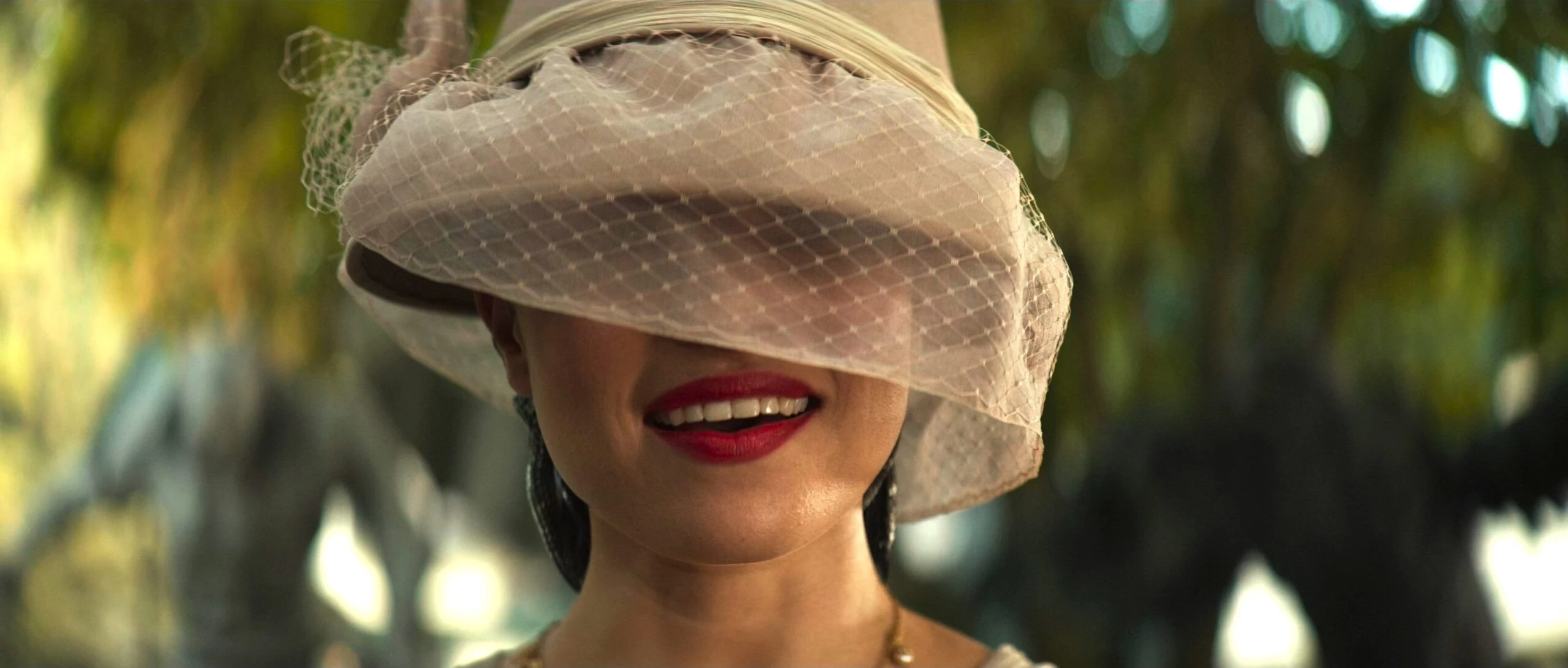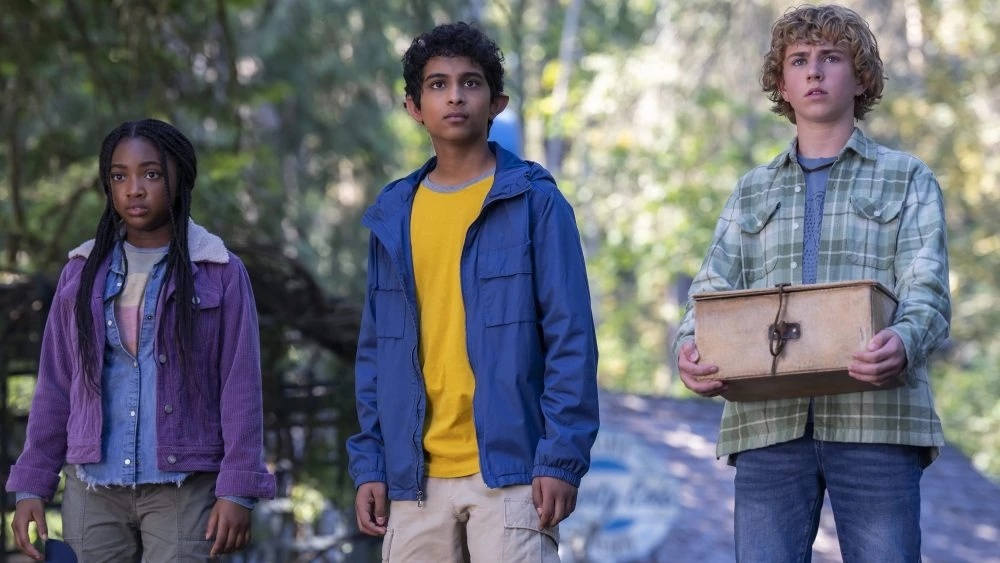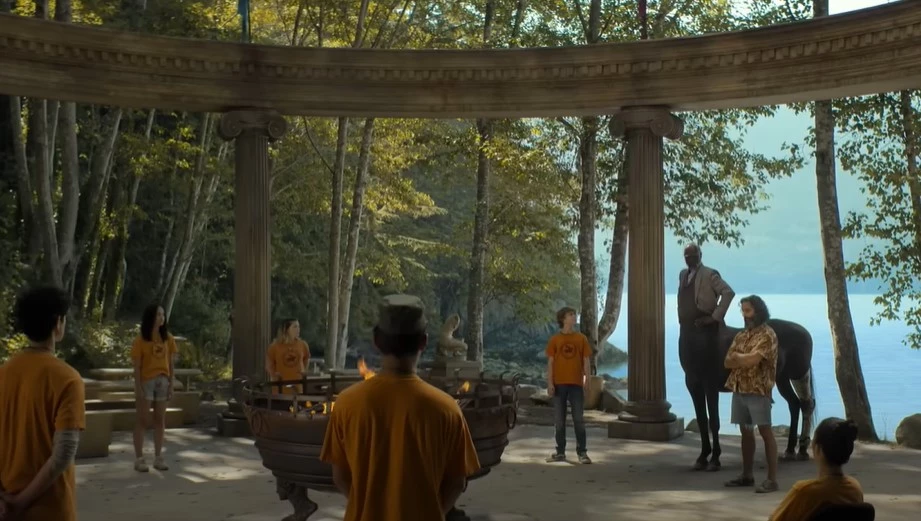Percy Jackson And The Olympians Episode 3 Recap: "We Visit the Garden Gnome Emporium"
"Percy Jackson and the Olympians" Episode 3, titled "We Visit the Garden Gnome Emporium," kicks off an important part in the series, rolling out new adventures and making the camp's story richer. This episode skillfully mixes the threads of ancient myths with the modern world, creating a narrative that's interesting and insightful. Let's dive into a detailed recap of this episode.
Advertisement
A Recap Of Percy Jackson And The Olympians Episode 3 - We Visit the Garden Gnome Emporium
 Source: Disney
Source: Disney
Episode 3 of "Percy Jackson and the Olympians" begins with an important moment for Percy as he starts his adventure, following a prophecy from the Oracle of Delphi. This quest, the key to the main story, is meant to lead him to the Underworld to retrieve Zeus' stolen master bolt. Accompanied by Annabeth Chase and Grover Underwood, Percy's journey beyond the safety of Camp Half-Blood unfolds amid a world full of gods and monsters.
The episode brings in some main story parts that will shape the trajectory of the series. The Oracle of Delphi, funnily changed from the original book series, presents Percy with a prophecy that predicts betrayal and loss, creating a tense and dark mood for his quest. This prophecy leads Percy to carefully choose his companions, Annabeth and Grover, in an attempt to avoid the predicted betrayal.
A big revelation in this episode is the true fate of Thalia, Zeus' daughter. Initially presumed dead, it's revealed that Thalia was turned into a pine tree by Zeus to honor her sacrifice, simultaneously providing a magical barrier protecting Camp Half-Blood. This backstory not only makes the camp's story richer but also underscores the complicated ways of godly meddling in the lives of demigods.
The episode looks into the reasons for Hades and the Furies. Unlike what Percy first thought of being targeted for death, it's revealed that Hades' actual intention is to capture him, making things more complex and mysterious about Hades' character and his role in the main story.
A touching moment in the episode is the reveal of Medusa's tragic backstory. Portrayed as a victim of the gods' whims, Medusa's tale adds a layer of tragedy and depth to her character, challenging the usual bad-guy image of the Gorgon.
As Percy, Annabeth, and Grover navigate these revelations and challenges, the episode also shows how they're getting closer and the strength of their bond. Percy's decision to decline Medusa's offer and his act of rebellion in mailing her head to Olympus highlight his growing leadership and moral compass.
The episode ends with a big story twist about the location of Olympus in modern America. The center of New York City, specifically the Empire State Building, is unveiled as the entrance to Olympus, a significant detail that links the ancient world of gods to current settings.
This episode, full of myths and character growth, sets the stage for the unfolding narrative and the challenges that Percy and his companions will face in their quest. The clever mixing of myth and the modern world, along with the deepening complexities of the characters and their relationships, make "We Visit the Garden Gnome Emporium" a key episode in the "Percy Jackson and the Olympians" series.
Advertisement
Percy Jackson And The Olympians Episode 3 Ending Explained
 Source: Disney
Source: Disney
The ending of "Percy Jackson and the Olympians" Episode 3, "We Visit the Garden Gnome Emporium," is key, both in its direct effects and how it sets the mood for future episodes. This section of the story connects different parts of the story and character arcs, adding depth and complexity to the overall plot.
One of the most significant aspects of the ending is the resolution of the encounter with Medusa. The encounter ends excitingly with Percy, Annabeth, and Grover defeating Medusa. Percy's decision to mail Medusa's head to Olympus serves as a strong act of rebellion against the gods, highlighting his growing courage and independence. This act symbolizes his resistance to the gods' often cruel and capricious nature, emphasizing his role as a hero who challenges the status quo.
Furthermore, the ending reveals crucial information about the location of Olympus in the modern world. The Empire State Building, a symbol of New York City's skyline, is shown to be the gateway to Olympus. This revelation is significant as it smoothly combines the myth world with the modern urban landscape, suggesting that the gods' influence extends into contemporary society. This common theme in the series adds a layer of relevance and accessibility to the mythology.
The episode also concludes with a feeling of hurry and excitement. The quest is not just a personal journey for Percy, Annabeth, and Grover but has wide-ranging effects, potentially affecting the balance between the gods and the human world. The looming deadline to return the master bolt to Zeus by the summer solstice adds a ticking clock element to their quest, making it more tense and risky.
Moreover, the ending gently prepares for what's next and character development. The dynamics within the trio of Percy, Annabeth, and Grover are tested and strengthened, hinting at deeper character arcs and growth in the episodes to come. The revelation of Olympus' location and the delivery of Medusa's head are likely to have significant repercussions, possibly leading to further interactions with the gods and new challenges.
In summary, the ending of Episode 3 is a wrap-up of the episode's story and a launchpad for upcoming tales. It combines the themes of heroism, rebellion against divine authority, and the clever mixing of ancient myths with the modern world, setting the stage for an exciting continuation of Percy Jackson's journey.
Advertisement
A Comprehensive Review Of "We Visit the Garden Gnome Emporium"
 Source: Disney
Source: Disney
"Percy Jackson and the Olympians" Episode 3, "We Visit the Garden Gnome Emporium," is an awesome mix of myth and fantasy with today's adventure that captivates and entertains. The episode excels in several aspects, making it a high point in the show thus far.
- Narrative and Pacing: The storyline is interesting and well-paced. It smartly mixes action, character growth, and moving the story along. The episode manages to bring in new stuff and characters without overwhelming the viewer, keeping the story flowing nicely and keeping one hooked from beginning to end.
- Character Development: The episode shines in showing the main characters. Percy's growth as a leader and a hero is clear, especially in his dealings with Medusa and the gods. Annabeth and Grover also get a lot of character growth, with their backstories and personalities being explored more deeply. This makes the audience feel more connected to their reasons and struggles.
- Mythological Integration: The show continues to impress with its cool way of bringing in Greek myths into a modern setting. The depiction of Medusa, the Oracle of Delphi, and the revelation of Olympus' location in New York City are particularly noteworthy. These elements are not just mere adaptations but are smartly redone to match the current story.
- Visuals and Special Effects: The episode looks great visually. The really good special effects, especially in the scenes involving Medusa and the magical aspects of Camp Half-Blood, are well-executed. The set design and the visual representation of mythical elements are both creative and believable.
- Overall Impression: Episode 3 keeps up the great quality of the series, balancing deep myths with interesting storytelling. It's an episode that not only moves the story forward but also makes the audience feel more connected to the characters and the world they inhabit. The ending leaves one can't wait for the next part.
Related Articles
- Who Plays Hades In The Percy Jackson Series? Meet Jay Duplass
- Who Are Nico And Bianca In Percy Jackson? A Complete Guide On "The Children Of Hell"
- Who Plays Augustus in Percy Jackson? Meet Ted Dykstra And Have A Comprehensive Character Guide
- Percy Jackson and the Olympians Episode 5 Recap & Review: "A God Buys Us Cheeseburgers"
- Percy Jackson and the Olympians Episode 6 Preview: Release Date, Time & Where To Watch
- Who is Echidna in Percy Jackson & the Olympians? Meet Suzanne Cryer as Echidna
- Percy Jackson And The Olympians Episode 4 Preview - "I Plunge to My Death"
- Percy Jackson And The Olympians Season 1 Episode 2 Recap & Review: 'I Become Supreme Lord Of The Bathroom'
- Percy Jackson Episode 3 Preview And Release Date: "We Visit the Garden Gnome Emporium"
- Percy Jackson And The Olympians Season 1 Episode 1 Recap & Review: 'I Accidentally Vaporize My Pre-Algebra Teacher'
Share this article
Advertisement